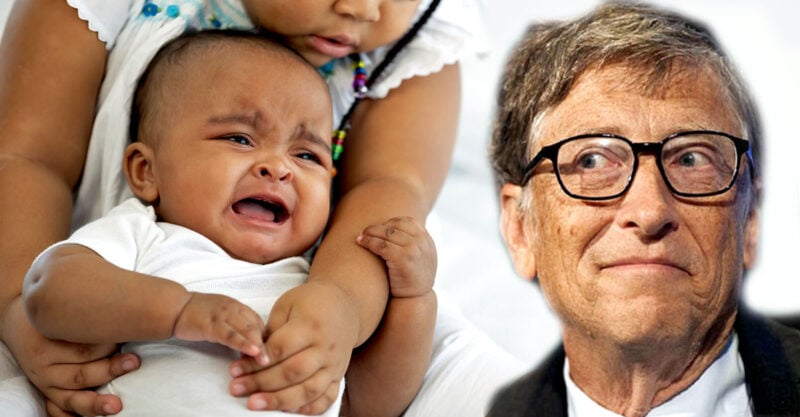by Megan Redshaw, Childrens Health Defense:

An Atlanta-based biotech company last week said it successfully concluded the first-ever clinical trial testing of a microarray injection-free vaccine on children as young as 9 months old.
Micron Biomedical tested microneedle-based delivery of the measles-rubella (MR) vaccine on children in Gambia with backing from the Bill & Melinda Gates Foundation and the Centers for Disease Control and Prevention (CDC).
TRUTH LIVES on at https://sgtreport.tv/
Microarray injections are administered via a microneedle patch that looks like a Band-Aid and is applied by pressing it to the skin. Once applied, microneedles penetrate the upper layer of the skin to deliver the vaccine.
The study, which researchers presented last week at the Microneedles 2023 conference in Seattle, evaluated the safety, immunogenicity and acceptability of the leading commercially available MR vaccine from the Serum Institute of India delivered by Micron’s microarray technology in adults, toddlers and infants.
Proponents of this vaccination method, such as Gavi, the Vaccine Alliance — of which the Gates Foundation is a founding member — call the patches “the future of vaccination, where these lifesaving interventions are delivered painlessly, without the need for syringes or perhaps even trained medical professionals.”
“Supporting innovations in vaccine delivery is critical to addressing ongoing health inequities,” James Goodson, co-investigator for the study and senior scientist and epidemiologist at the CDC’s Global Immunization Division, said in the press release.
He added that the study also is a key step toward getting the patches licensed.
Developers tout the technology as painless — it feels like Velcro, they claim — and more thermostable than traditional vaccines.
This would make widespread global distribution of the vaccines easier, they said, particularly in developing areas that may lack infrastructure, such as refrigeration, and trained professionals.
Microneedle vaccine market worth billions
Micron’s CEO, Steven Damon, said: “Micron, with support from the Bill & Melinda Gates Foundation and the CDC, is thrilled to accomplish a major milestone in the future of injection-free administration of necessary and potentially life-saving vaccines and therapeutics.”
With this trial, the company remains at the forefront of bringing microarray-based vaccine products to market, Damon said.
The Gates Foundation, the CDC, Unicef, PATH — another heavily Gates-funded organization — and the Georgia Research Alliance provided Micron with $40 million in funding to develop its microneedle patch technology.
In 2017, the Gates Foundation gave Micron a $2.2 million grant to develop the microneedle patch for the MR vaccine and another $900 million in 2022. Gates had previously awarded Micron $2.5 million to develop a microneedle patch for polio as part of the foundation’s effort to eradicate polio.
In the last several months, Micron also received significant funding from investors like Global Health Investment Corporation and LTS Lohmann. And less than two weeks ago, just before it presented the study results at the Microneedles 2023 conference, the company secured an additional $3 million investment from J2 Ventures, bringing its total Series A funding to $17 million.
Series A funding, the first round of equity financing for a startup company after it has demonstrated some success with seed funding, precedes a public offering.
Trials for vaccine patches against COVID-19, seasonal influenza and hepatitis B also are ongoing, while patches against human papillomavirus, typhoid and rotavirus are in preclinical development.
The microneedle vaccine market for the flu vaccine alone is projected to reach $2.3 billion by 2030.
Last year, Mark Prausnitz, Ph.D., co-founder and chief scientific advisor to Micron Biomedical presented Micron’s technology at a White House panel discussion, Innovation in Vaccine Delivery.
The panel, chaired by Dr. Francis Collins, then-director of the National Institutes of Health, explored “a path toward innovative, next-generation COVID-19 vaccines and vaccine delivery technologies.”
“This technology has revolutionary potential for extending the reach of vaccines in low resource settings and during pandemics,” David Hoey, president and CEO of Vaxxas, a biotechnology company based in Brisbane, Australia, told Gavi.
Hoey’s company has patches against measles and rubella, COVID-19 and seasonal influenza in human trials.
‘Safe and well tolerated with no allergic reactions or related serious adverse events’
Forty-five adults, 120 toddlers (15-18 months old) and 120 infants (9-10 months old) were enrolled in the clinical trial and randomized to receive the MR vaccine either via Micron’s microarray or through subcutaneous injection, meaning beneath the skin.
The study has not yet been published, but in a press release, Micron reported that vaccination by microarray was found to be “safe and well tolerated with no allergic reactions or related serious adverse events.”
The study reported similar seroprotection rates of approximately 90% or more after 42 days for the groups that received the microarray and subcutaneous injections.
“Generally, parents were very positive about the ability to vaccinate their young infants without a needle,” Damon said.
Read More @ ChildrensHealthDefense.org



